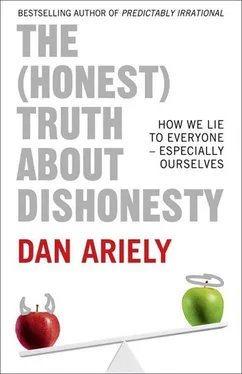Ariely, Dan - The (Honest) Truth About Dishonesty - How We Lie to Everyone – Especially Ourselves
Здесь есть возможность читать онлайн «Ariely, Dan - The (Honest) Truth About Dishonesty - How We Lie to Everyone – Especially Ourselves» весь текст электронной книги совершенно бесплатно (целиком полную версию без сокращений). В некоторых случаях можно слушать аудио, скачать через торрент в формате fb2 и присутствует краткое содержание. Жанр: Старинная литература, на английском языке. Описание произведения, (предисловие) а так же отзывы посетителей доступны на портале библиотеки ЛибКат.
- Название:The (Honest) Truth About Dishonesty: How We Lie to Everyone – Especially Ourselves
- Автор:
- Жанр:
- Год:неизвестен
- ISBN:нет данных
- Рейтинг книги:4 / 5. Голосов: 1
-
Избранное:Добавить в избранное
- Отзывы:
-
Ваша оценка:
- 80
- 1
- 2
- 3
- 4
- 5
The (Honest) Truth About Dishonesty: How We Lie to Everyone – Especially Ourselves: краткое содержание, описание и аннотация
Предлагаем к чтению аннотацию, описание, краткое содержание или предисловие (зависит от того, что написал сам автор книги «The (Honest) Truth About Dishonesty: How We Lie to Everyone – Especially Ourselves»). Если вы не нашли необходимую информацию о книге — напишите в комментариях, мы постараемся отыскать её.
The (Honest) Truth About Dishonesty: How We Lie to Everyone – Especially Ourselves — читать онлайн бесплатно полную книгу (весь текст) целиком
Ниже представлен текст книги, разбитый по страницам. Система сохранения места последней прочитанной страницы, позволяет с удобством читать онлайн бесплатно книгу «The (Honest) Truth About Dishonesty: How We Lie to Everyone – Especially Ourselves», без необходимости каждый раз заново искать на чём Вы остановились. Поставьте закладку, и сможете в любой момент перейти на страницу, на которой закончили чтение.
Интервал:
Закладка:
In our initial (paper-based) experiments, it was not possible to figure out exactly when our participants’ eyes wandered to the answer key and the level to which they were aware of the help that they got from the written answers. So in our next experiment, we had our participants take a computerized version of the same test. This time the answer key at the bottom of the screen was initially hidden from sight. To reveal the answers, participants had to move the cursor to the bottom of the screen, and when the cursor was moved away, the answer key was hidden again. That way the participants were forced to think about exactly when and for how long they used the answer key, and they could not as easily ignore such a clear and deliberate action.
Although almost all of the participants consulted the answer key at least once, we found that this time around (in contrast to the paper-based tests) they did not overestimate their performance in the second test. Despite the fact that they still cheated, consciously deciding to use the answer key—rather than merely glancing at the bottom of the page—eliminated their self-deceptive tendencies. It seems, then, that when we are made blatantly aware of the ways we cheat, we become far less able to take unwarranted credit for our performance.
Self-deception and Self-help
So where do we stand on self-deception? Should we maintain it? Eliminate it? I suspect that self-deception is similar to its cousins, overconfidence and optimism, and as with these other biases, it has both benefits and disadvantages. On the positive side, an unjustifiably elevated belief in ourselves can increase our general well-being by helping us cope with stress; it can increase our persistence while doing difficult or tedious tasks; and it can get us to try new and different experiences.
We persist in deceiving ourselves in part to maintain a positive self-image. We gloss over our failures, highlight our successes (even when they’re not entirely our own), and love to blame other people and outside circumstances when our failures are undeniable. Like our friend the crab, we can use self-deception to boost our confidence when we might not otherwise feel bold. Positioning ourselves on the basis of our finer points can help us snag a date, finish a big project, or land a job. (I am not suggesting that you puff up your résumé, of course, but a little extra confidence can often work in our favor.)
On the negative side, to the extent that an overly optimistic view of ourselves can form the basis of our actions, we may wrongly assume that things will turn out for the best and as a consequence not actively make the best decisions. Self-deception can also cause us to “enhance” our life stories with, say, a degree from a prestigious university, which can lead us to suffer a great deal when the truth is ultimately revealed. And, of course, there is the general cost of deception. When we and those around us are dishonest, we start suspecting everyone, and without trust our lives become more difficult in almost every way.
As in other aspects of life, here too the balance lies between happiness (partially driven by self-deception) and optimal decisions for the future (and a more realistic view of ourselves). Sure, it is exciting to be bright-eyed, with hopes for a wonderful future—but in the case of self-deception, our exaggerated beliefs can devastate us when reality comes crashing in.
Some Upsides of Lying
When we lie for another person’s benefit, we call it a “white lie.” When we tell a white lie, we’re expanding the fudge factor, but we’re not doing it for selfish reasons. For example, consider the importance of insincere compliments. We all know the gold standard of white lies, in which a woman who is less than svelte puts on a slinky new dress and asks her husband, “Do I look fat in this?” The man does a quick cost-benefit analysis; he sees his whole life pass before his eyes if he answers with the brutal truth. So he tells her, “Darling, you look beautiful.” Another evening (marriage) saved.
Sometimes white lies are just social niceties, but other times they can work wonders to help people get through the most difficult of circumstances, as I learned as an eighteen-year-old burn victim.
After an accident that nearly killed me, I found myself in the hospital with third-degree burns covering over 70 percent of my body. From the beginning, the doctors and the nurses kept telling me, “Everything will be okay.” And I wanted to believe them. To my young mind, “Everything will be okay” meant that the scars from my burns and many, many skin transplants would eventually fade and go away, just as when someone burns himself while making popcorn or roasting marshmallows over a campfire.
One day toward the end of my first year in the hospital, the occupational therapist said she wanted to introduce me to a recovered burn victim who’d suffered a similar fate a decade earlier. She wanted to demonstrate to me that it was possible for me to go out into the world and do things that I used to do—basically, that everything would be okay. But when the visitor came in, I was horrified. The man was badly scarred—so badly that he looked deformed. He was able to move his hands and use them in all kinds of creative ways, but they were barely functional. This image was far from the way I imagined my own recovery, my ability to function, and the way I would look once I left the hospital. After this meeting I became deeply depressed, realizing that my scars and functionality would be much worse than I had imagined up to that point.
The doctors and nurses told me other well-meaning lies about what kind of pain to expect. During one unbearably long operation on my hands, the doctors inserted long needles from the tips of my fingers through the joints in order to hold my fingers straight so that the skin could heal properly. At the top of each needle they placed a cork so that I couldn’t unintentionally scratch myself or poke my eyes. After a couple of months of living with this unearthly contraption, I found that it would be removed in the clinic—not under anesthesia. That worried me a lot, because I imagined that the pain would be pretty awful. But the nurses said, “Oh, don’t worry. This is a simple procedure and it’s not even painful.” For the next few weeks I felt much less worried about the procedure.
When the time came to withdraw the needles, one nurse held my elbow and the other slowly pulled out each needle with pliers. Of course, the pain was excruciating and lasted for days—very much in contrast to how they described the procedure. Still, in hindsight, I was very glad they had lied to me. If they had told me the truth about what to expect, I would have spent the weeks before the extraction anticipating the procedure in misery, dread, and stress—which in turn might have compromised my much-needed immune system. So in the end, I came to believe that there are certain circumstances in which white lies are justified.
CHAPTER 7
Creativity and Dishonesty
We Are All Storytellers
Facts are for people who lack the imagination to create their own truth.
—ANONYMOUS
Once upon a time, two researchers named Richard Nisbett (a professor at the University of Michigan) and Tim Wilson (a professor at the University of Virginia) set up camp at their local mall and laid out four pairs of nylon stockings across a table. They then asked female passersby which of the four they liked best. The women voted, and, by and large, they preferred the pair on the far right. Why? Some said they liked the material more. Some said they liked the texture or the color. Others felt that the quality was the highest. This preference was interesting, considering that all four pairs of stockings were identical. (Nisbett and Wilson later repeated the experiment with nightgowns, and found the same results.)
Читать дальшеИнтервал:
Закладка:
Похожие книги на «The (Honest) Truth About Dishonesty: How We Lie to Everyone – Especially Ourselves»
Представляем Вашему вниманию похожие книги на «The (Honest) Truth About Dishonesty: How We Lie to Everyone – Especially Ourselves» списком для выбора. Мы отобрали схожую по названию и смыслу литературу в надежде предоставить читателям больше вариантов отыскать новые, интересные, ещё непрочитанные произведения.
Обсуждение, отзывы о книге «The (Honest) Truth About Dishonesty: How We Lie to Everyone – Especially Ourselves» и просто собственные мнения читателей. Оставьте ваши комментарии, напишите, что Вы думаете о произведении, его смысле или главных героях. Укажите что конкретно понравилось, а что нет, и почему Вы так считаете.












